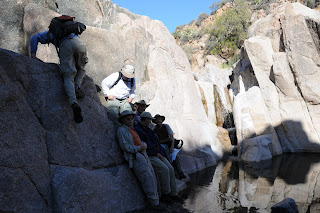NEW PERSPECTIVES ON THE HISTORY OF RICHINBAR MINE
For your consideration.....
One of the great things about the blogosphere is its
networking opportunities. Because of this blog, I
frequently receive emails from like-minded hikers and outdoor enthusiasts
telling me of obscure routes, warnings of road closures and contributing interesting
info about various AZ trails.
Recently, local mineral expert Gary Carter shared some enlightening
observations about Richinbar Mine (a very popular hike in the Agua Fria National Monument area) and gave me permission to share them with
you, to augment your understanding of the area's muddled history. Here are Gary's findings:
The Richinbar Mine area—sure is an interesting old site
and easy to get to (which will eventually be its death).
Anyway, I have been out there many times and done some
detailed reading and observations about the area at the Arizona Geological Society (downtown
Phoenix).They have a file of over 100 photos on the Richinbar.
My intent here is just to make sure you are aware of some
falsehoods about the mine.
• The Az. Pioneer Cemetery
group are to be commended on what they are trying to do--however not everyone agrees with their info or
interpretations—especially. those with background/training in geology/mining.
They also will not make corrections when they are notified of errors.
2 My background is in minerals and recently I also took an
exploration geologist of long standing and high regard to the site ---to
confirm some of my thoughts and to see what else he could tell me. The mine was not a rich
one—in fact they were in pretty low grade ore for much of the time, they operated on a shoestring.
4 Copper was never a major product from that mine---it was
basically a tourmaline/ quartz vein with minor gold they were following.
5 The two shafts further from
the mill workings were probably dug first since the concrete footings for the
first stamp mill are directly across from it on the Aqua Fria side of the
slope.
The dump of waste rock sits
right behind and below the Zyke shaft which fed the ball mill and circular
cyanide tanks that have left their tailings and depression . Not near enough
tonnage to indicate they could or did process much ore. A tailings pond (for waste
material) is still evident as a small plateau like area of pinkish cyanide
tailings below the now dry wash. There is no evidence –either
visual nor in the research of any graves or burials on the property.
I have been involved in so much
research on old mine sites where folks with no expertise or backup research
(other than what they read on the net) have added to the historical falsehoods,
myths and confusion. Can’t tell you how many phony stories –even TV docs and
videos have been circulated about the old Vulture Mine, outside of Wickenburg.
They were done by well meaning folks who did a modicum of reading, guessing and
hypothesizing—yet passed on inaccurate info about the subject. Once done it is
very difficult to “take it back” or correct it.
HIKE DETAILS:
LENGTH: 1.5
miles one way to the mine.
(We wandered around the site for a total hike of just under
4 miles).
RATING: easy
ELEVATION: 3,370' – 3,497'
GETTING THERE:
From Phoenix, go north on I-17 (roughly 35 miles) to the
Sunset Point rest area. From here,
continue 1.7 miles to the turnoff
for FR9006 on the right. A
windmill and stock tanks are your landmark. (if you reach Badger Springs Road,
you've gone 2.3 miles too far. Turn onto FR9006 and park in the dirt lot being
sure not to block the gate. The gate is usually locked, but it's easy (and
legal) to squeeze through.
Roads are paved up to the dirt parking area.
INFO:
Agua Fria National Monument: general info and maps
https://www.blm.gov/visit/agua-fria
Arizona Pioneer & Cemetery Research Project: historical
info and photos















































